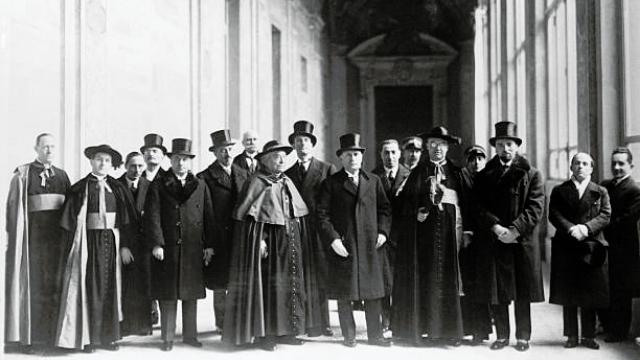(ITALY)
Bitter Winter - Center for Studies on New Religions [Torino, Italy]
March 3, 2022
By Massimo Introvigne
While in Italy the Concordat with the Catholic Church creates a special situation, in other countries attacks against the legal protection of the confessional secret are gaining momentum.
Religious Confession and Evidential Privilege in the 21st Century (Cleveland, Queensland: Shepherd Street Press, 2021), edited by Mark Hill and A. Keith Thompson, is an important book I started reviewing in the previous article of this series. I examined how the idea that either the laws protecting the secret of confession and other similar religious practices should be abrogated altogether, or exceptions should be made for cases of child sexual abuse, originated in Australia, where the recommendation of a Royal Commission into Institutional Responses to Child Abuse in this direction have been implemented in several states and territories. Other chapters of the Hill-Thompson book are about countries of Europe.
Marco Ferrante discusses the very special situation of Italy, where not only the secrecy of confession is protected but the case law maintains that breaching the confidentiality of the Catholic confession is in itself a crime under Article 622 of the Criminal Code, which protects the “professional secret” in general. Very wisely, the Italian Catholic Church never became part of the Concordat of 1929, revised and re-signed in 1984, which as a consequence is an international treaty between two sovereign states, Italy and the Vatican, as such largely subtracted from the jurisdiction of the Italian courts.
The Concordat has a broad protection of the confidentiality of Catholic confession, but similar provisions are included in agreements with the Jewish Communities and the small Italian Lutheran Church. Courts have ruled that the privilege extends indeed to ministers of all denominations. In view of the special status of the Concordat with the Catholic Church, and of constitutional principles mandating that the same privileges should be granted to all religions, Ferrante believes it is unlikely that cases of sexual abuse by priests and ministers, which have also been reported in Italy, would determine a change in the existing protection.

Mark Hill and Christopher Grout present the situation in England and Wales, where the Canon Law of the established Church of England is part of civil law. The Church of England allows for the possibility of private confession, although it is not frequent. Since 1603, its secrecy has been protected, with the exception of crimes so serious, including high treason, that not disclosing them might lead to the death penalty. Since there is no death penalty in England any longer, this exception is now of no effect.
Recently, the authors report, because of the controversy on child sexual abuse, the Church of England has adopted the solution the Catholic Church refused in Australia, instructing ministers to withhold absolution unless perpetrators promise to report themselves to the authorities. It has also explained that a common conversation between a minister and a parishioner is not a confession, and is not protected by the confessional privilege.

The two authors of the chapter report a disagreement between themselves on whether the protection granted to Church of England pastors extends to ministers of other religions. The authors agree that in the British system it is still true that “a priest of the Church of England is in a very different position from a priest of the Roman Catholic Church” (162) or a minister of any other religion.
In a famous case of 1860, a Catholic priest was convicted for contempt of court after he had invoked the privilege of confession not to disclose from whom he had received a stolen watch. Today, Hill believes that as a signatory of the European Convention on Human Rights, Britain should extend the confessional privilege to all religions, although Grout disagrees.
Andreas Heriksen Aarflot compares the situation of Norway and Sweden with respect to national Lutheran churches. They both retain auricular confession as a possibility, as did Martin Luther himself, although it is not mandatory and, as in the Church of England, is not frequent. In Norway, but not in Sweden, Lutheran laypersons may also hear confessions, rather than pastors only.
When confession occurs, ecclesiastical law mandates that what the penitent told should not be disclosed to anybody, including secular authorities. In Norway, this was also a provision of the Criminal Code until 2021, although it was unclear whether the same rules applied also to laypersons who heard confessions or to pastors only.

There were, however, exceptions as the protection of confession did not apply in cases of very serious crimes, such as homicide, rape, or treason, and the Norwegian Church itself in 2019 stated that in cases of sexual abuse the duty of confidentiality relating to confession is not unconditional and pastors should respect “current [state] regulations.”
In Sweden, breaching the seal of the Lutheran confessional was a capital offence until 1889. The Church of Sweden was disestablished in 2000, with the consequence that pastors who breach the duty of confidentiality with respect to confessions are now punished by the church but not by the state.
Even after the child abuse scandals, the Church of Sweden maintains that priests should not report to the authorities the content of confession, although they should report information obtained outside of the confessional context. Since confession is rare, courts of law in Sweden, as in Norway, did not have the opportunity so far to test how the internal rules of the Church interact with the mandatory report provisions of the state.
Ireland is one of the countries where child abuse scandals involving the Catholic clergy have deeply transformed the religious landscape. Even before independence, some local judges had recognized the inviolability of Catholic confession. After independence, the matter became political, as stating emphatically that the Catholic confession was protected meant for some judges expressing their repudiation of the British past and their persuasion that Ireland was now a Catholic country.
As Stephen Farrell explains in his chapter, Irish judges were less keen to extend the protection to other religions. One example is the 2001 Johnson case, where a judge ruled that auditing in the Church of Scientology was not protected, based on the quite Catholic argument that there was no evidence that Scientology taught that breaching the confidentiality of auditing would “lead to some kind of eternal punishment” (207).
All this changed with the pedophile priests crisis. In 2015, the Children First Act became “the first instance of the Irish legislature directly legislating in a way that precludes a priest from relying in any way on the seal of the confession,” although it was limited to instances of child sexual abuse (215–16). The Catholic Church reacted by informing the government that priests would not comply with the provision, regardless of the consequences.
Farrell speculates on possible defenses priests may have based on other laws, and consequences for other religions, although at the time of his writing there were not yet cases decided by Irish courts on the basis of the 2015 law. What was clear was that “the ongoing reception of the seal of the confession by Irish civil law is now more precarious than at any point since independence” (217).
